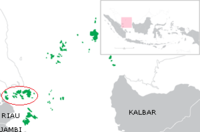East Kalimantan: A New Front For Regional Maritime Security?
By RSIS
Like the Riau Archipelago and for the same reasons, East Kalimantan is emerging as a ‘hub’ for illegal maritime activities. Can the strategy for the Riau Archipelago – introducing patrols and foreign assistance — be replicated here?
By Alban Sciascia and Eric Frécon
MARITIME EXPERTS have long focused on the Riau Archipelago when looking at the problem of piracy in Indonesia. The last spate of attacks – 30 incidents in the South China Sea off Natunas and Anambas regencies from January to September 2010 – underscored the need for further investigation into these incidents. What about the other sea lines of communication (SLOC) in the region? Are there similar problems of piracy along other chokepoints?
Beyond the Malacca Strait
To the south of Sumatra, the Sunda Strait is considered challenging due to the strong currents and shallow depths. Three attacks committed by sea robbers were reported along its shores in 2009. But the trend is more worrying in the busier waters off East Kalimantan, specifically the Lombok and Makassar Straits where deeper draft vessels — and nuclear submarines — traverse. East Kalimantan has some similarities with the Riau Archipelago. On land, one finds former sultanates leaving behind their residual regional and maritime networks. The Riau Archipelago and East Kalimantan are two large outer provinces, with swamps, limited transportation and remote kampungs along their northern borders, respectively in the Anambas and in the Nunukan regencies. Border tensions in the South China Sea and off Ambalat, in the Sulawesi Sea, do not help the conduct of well-coordinated patrols.
Lastly, the natural resources have attracted migrants, mostly Javanese. This is the case in Tarakan, in the north of East Kalimantan, which, like Batam, has the status of city (kota) and the ambition, according to its official website, to be “the new Singapore”. And like Batam, it is becoming the meeting point of idle and unemployed people as well as a logistical hub to set up gangs, recruit robbers and spend booties.

Unsurprisingly, this geographical environment in East Kalimantan is conducive to maritime crimes, as in the Riau Archipelago. Besides pirates, money, arms and militants most likely still traverse the nearby borders. Illicit fishing is also common in disputed waters. Reports suggest the region remains a hotspot for small arms trafficking. Several other illegal activities occur in this northeast part of Kalimantan like logging and goods smuggling (cigarettes, alcohol, oil). Last but not least, human trafficking and smuggling are rife in the frontier areas.
Beyond Coordinated Patrols and Navies
Although Tarakan does not seem to be a base for these illicit activities, the similar conditions with the Riau Islands that could engender piracy and other maritime crimes call for a pre-emptive look at this potential SLOC.
Firstly, the Malacca Straits Patrols (MSP) provided lessons for trilateral cooperation. As they seem to have been useful as a means of deterrence, the model should be applied off East Kalimantan and in the Sulu Archipelago where there is, in fact, a long history of piracy and maritime insecurity. Intelligence exchanges could also strengthen maritime security. In this regard, joint training already exists.
Besides the MSP, the United States is active on a regular basis. Washington has set up radars along both the Malacca and Makassar Straits. The International Criminal Investigative Training Assistance Programme or ICITAP is looking more closely at East Kalimantan after having been active in Batam. ICITAP was initiated by the US Department of Justice in 1986 to offer training in more than 46 countries challenged by transnational criminal activities. The first deployment took place in Colombia.
In Indonesia, this initiative has always dealt with maritime security. As a first step, the programme comprised diving training for the Maritime Police. Then, the US assistance has provided interdiction capabilities to the maritime police. The training on interdiction at sea has been managed by the US Navy Seals; the one on maintenance has been provided by the US Navy Small Boats Operators.
ICITAP is now launching its third step in Indonesia with the creation of a Joint Command Centre in Jakarta. The main aim is to develop cooperation in a country where more than ten agencies are responsible for border protection and security at sea. A partnership between the Ministry of Fisheries and the Maritime Police has already been concluded and a floating Operational Command centre is ready to work in Tarakan. Even if ICITAP is a low profile initiative, the process, which began ten years ago in Indonesia, seems effective. As a follow-up, ICITAP has also improved its cooperation with the Philippines Maritime Police by providing boats and equipment.
Indonesia, the Key Player
Indonesia must however not remain passive. Disagreements could emerge over clashing agendas — between Indonesia’s goal of countering illegal fishing and the US’ priorities in the fight against terrorism and monitoring the SLOCs. Will these two countries be able to work with transparency in the long term? Jakarta has to enhance the cooperation between its numerous agencies in charge of safety and the security at sea via the Indonesian Maritime Security Coordinating Board (Bakorkamla). The ICITAP orientation to support the police entities – not the military ones – reveals an urgent need to improve the involvement of the whole spectrum of Indonesian law enforcement agencies.
Secondly, the recent ethnic tensions between the Tidung and Bugis in Tarakan serve as a reminder that the roots of maritime crime are on land. Like in the Riau Archipelago where there is socio-economic tension, human and community securities are the first steps in addressing coastal challenges.
Alban Sciascia is a Ph.D. candidate at the Institute of East Asian Studies, Ecole Normale Supérieure (Lyon). He is also an associate researcher at the Naval Centre for Advanced Studies, Ecole militaire (Paris). Eric Frécon is a Research Fellow at the S. Rajaratnam School of International Studies (RSIS), Nanyang Technological University, where he serves on the Indonesia Programme.
